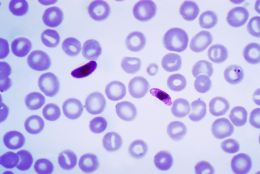Mass drug administrations can grant population protection against malaria

Researchers have provided the first evidence that mass drug administration (MDA) can grant community-level protection against Plasmodium falciparum (P. falciparum) malaria.
Their findings, published today in eLife, suggest that malaria elimination programs intending to use MDA as part of their efforts should approach communities in a way that encourages high levels of buy in and participation.
The global burden of malaria has decreased over the last decade and many nations are aiming to eliminate the disease altogether, but a major challenge to this goal is people carrying malaria parasites without showing any symptoms.
One method to help clear all infections in a community is MDA, whereby everyone is asked to take antimalarial drugs at the same time, regardless of whether or not they feel ill. This approach should be used only after routine malaria control measures are established, such as the distribution of mosquito nets and treatment of clinical cases.
"Several studies have shown that MDA is a promising approach for reducing malaria burdens, but its success depends largely on community buy in," explains first author Daniel Parker, Assistant Professor in the Department of Population Health and Disease Prevention at the University of California, Irvine, US. "If enough community members participate, then even those who aren't treated, such as young children or pregnant women, should be better protected as the number of infections are reduced—otherwise known as the 'herd effect'. However, the idea of a herd effect providing additional levels of population protection against malaria has not yet been observed."
To explore this, Parker and his team used detailed data from an MDA trial in Kayin State, Myanmar. Their study covered four villages, which were selected based on P. falciparum malaria prevalence surveys, over the period from May 2013 to June 2015. A total of 3,229 villagers, including both males and females, were included in the analysis.
Their findings revealed that individuals who lived in a neighbourhood with high participation in MDA were less likely to have malaria. Meanwhile, those from neighbourhoods with low MDA adherence had an almost three times higher chance of contracting malaria following treatment. In both cases, these results were regardless of whether or not the individuals took antimalarial drugs themselves, meaning that community participation is crucial to MDA success.
"MDA is an important tool in the fight against malaria, and our work paves the way for further research and improvements to current practices concerning this method," Parker concludes. "In particular, it highlights the importance of approaching communities in an engaging and appropriate manner if we are to encourage their involvement in MDA."
More information: Daniel M Parker et al, Potential herd protection against Plasmodium falciparum infections conferred by mass antimalarial drug administrations, eLife (2019). DOI: 10.7554/eLife.41023




















